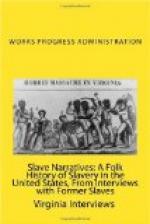Some of the other old Masters, who had lots of slaves on fa’ms close by, was so mean to the slaves they owned. They wo’ked the women and men both in the fields and the children too, and when the ole Master thought they was’n’t do’n’ ’nuf wo’k, he would take his men and strip off their shirts, and lash them with cow-hide whips until you could see the blood run down them poor niggers backs.
The Nigger traders would come through and buy up a lot of men, and women slaves, and get a big drove of them and take them further south to work in the fields, leavin their babies. I’se never can forget. I know’d some mean ole masters.
Our ole master Dale that raised my Mammy and her family never was hard or mean like that. He would let us go to church, have parties and dances. One of the ole salves would come to our cabin with his fiddle and we’d dance.
After I’se grow’d up, I’se wo’ked for Mrs. Susan Lovell, that was the ole masters married daughter. She lived down the road from his fa’m. She was good to me! You see I was named after Susan Lovell. It was while I was wo’kin’ fo’ her when the war ended. She told me I was free after the war was over. I got happy and sung but I didn’t know for a long time, what to be free was, so after the war she hired me and I stayed on doin’ all the cookin’ and washin’ and all the work, and I was hired to her for four dollars a month. After the war was over my father died. And it wasn’t long after that, I Married Wm. Sanders and we had six children. I got a Government pension, as my husband was in the army during the Civil War and he was wounded in the body, but he lived a long time after the war was ended.
In the ole days we used to sing and go to church, sing the ole time religion, and when we danced we sung: “Who’s been here since I’se been gone, Ah, that gal with the blue dress on.”
I’se still believes in lots of good and bad luck signs, but forget most of ’em, “But if you drap a knife, on the floor someone is sure to come to see you, and if you dream of money that is good luck.” “To sneeze at the table is bad luck, to sneeze when away from the table good luck.” “If you dream of the stars is bad luck.”
John Anderson:
A story resulting from an interview with John Anderson, an old Negro slave:
“I was born in Pennsylvania, on Shiptown road, Clinton County, close to Mercersberg. When I was growing up my mammy always believed in making her own medicine, and doctored the whole family with the roots she dug herself. She use to bile down the roots from may-apple, snake root and blood root, and make her medicine. This was good for the blood and keep us from gettin’ sick.




